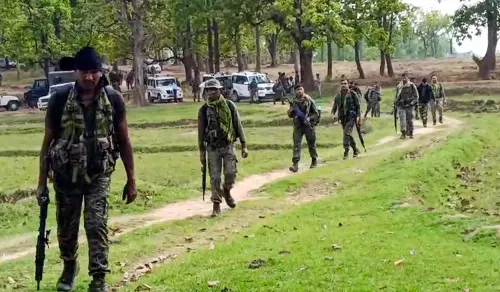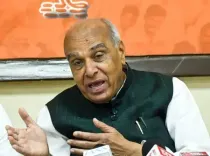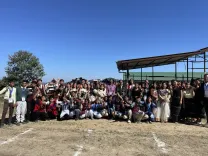Hezbollah Leader Confirms Disruption of Arms Supply Route via Syria

Beirut, Dec 15 (NationPress) Hezbollah leader Naim Qassem has affirmed that the Lebanese militia has experienced a temporary loss of its arms supply route through Syria after the recent collapse of Bashar al-Assad's government.
In his first televised address on Saturday since the fall of Assad's regime, Qassem recognized the disruption, labeling it a "detail" in the wider context of Hezbollah's activities.
He noted that the supply route might be reinstated once a new government is established, or Hezbollah could explore alternative channels.
"Yes, Hezbollah has lost the military supply route through Syria at this stage, but this loss is a detail in the resistance's work," Qassem stated.
"A new regime could emerge, and this route could return to normal, and we could seek other options," he added.
Hezbollah began its involvement in Syria in 2013 to assist Assad in suppressing rebels attempting to overthrow him. Recently, as rebels neared Damascus, the group deployed supervisory officers to manage a withdrawal of its fighters from the region.
The more than 50 years of rule by the Assad family has been succeeded by a transitional caretaker government established by Hayat Tahrir al-Sham, a former al-Qaeda affiliate that led the rebel offensive.
The Hezbollah leader also remarked that Syria's new authorities should refrain from recognizing neighboring Israel or forming ties with it.
Syria historically provided a land route for Hezbollah's patron, Iran, to send arms convoys to Lebanon. Although these convoys were frequently targeted by Israeli airstrikes, the group managed to arm itself significantly.
A coalition of militant factions, spearheaded by Hayat Tahrir al-Sham, seized control of Damascus on December 8, resulting in the downfall of Assad's government.
Qassem stated that Hezbollah could only evaluate the new regime after it stabilizes and clarifies its stance. However, he expressed hope that the Lebanese and Syrian peoples and governments would maintain cooperation.
Despite this setback, Qassem reiterated that Hezbollah's resistance would persist.
In his address, Qassem did not mention Assad by name, asserting that the group "cannot judge these new forces until they stabilize" and take definitive positions, but he expressed hope for continued collaboration between the Lebanese and Syrian people and governments.
"Yes, Hezbollah has lost the military supply route through Syria at this stage, but this loss is a detail in the resistance's work," Qassem emphasized.
"A new regime could emerge, and this route could return to normal, and we could explore other avenues," he reiterated.
Syria has traditionally served as a land conduit for Hezbollah's benefactor, Iran, to dispatch arms convoys to Lebanon. These convoys were often targeted by Israeli airstrikes, yet the militant group succeeded in arming itself extensively.
Hezbollah commenced its intervention in Syria in 2013 to assist Assad in quelling the rebels seeking to overturn his regime. Last week, as rebels advanced towards Damascus, the group dispatched supervising officers to oversee the withdrawal of its forces.
More than half a century of Assad family governance has now transitioned to a caretaker government established by Hayat Tahrir al-Sham, a former al-Qaeda affiliate that led the rebel assault.
The Hezbollah leader also emphasized that Syria's new rulers should not recognize neighboring Israel or normalize relations with it.
"We hope that this new governing body will view Israel as an adversary and not engage in normalization of ties with it," Qassem stated.
Syrian rebel leader Ahmad al-Sharaa, known as Abu Mohammed al-Julani, remarked on Saturday that Israel has "no more excuses" to conduct airstrikes in Syria, claiming that recent Israeli Defense Forces (IDF) operations on Syrian soil have crossed unacceptable boundaries and posed a risk of escalating tensions in the region.
Nevertheless, he mentioned that his faction does not seek further conflict in the area.









